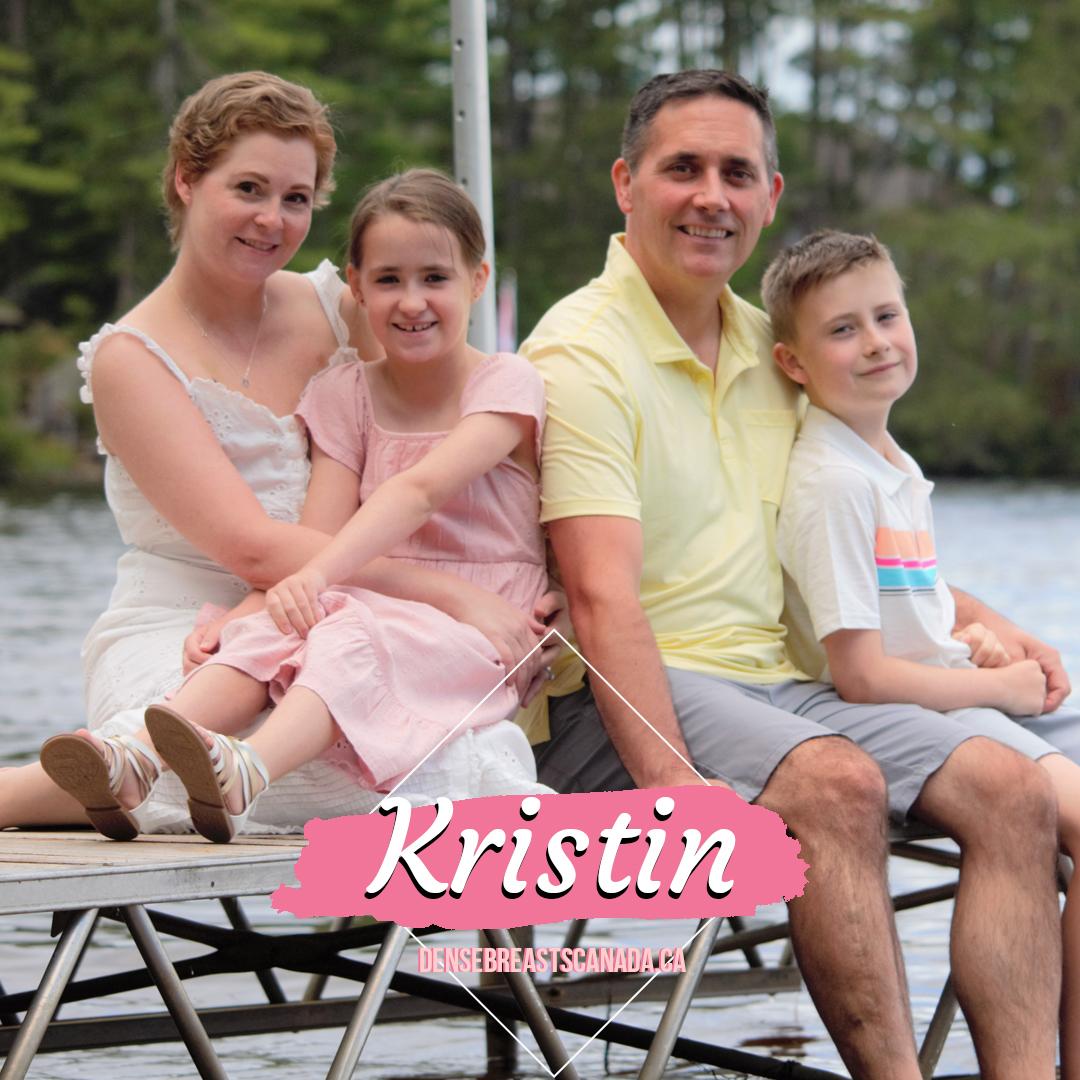In Memory: Kristin Steeves

My breast cancer story begins much earlier than my own personal diagnosis. At the age of 36, my mother was diagnosed with stage 4 breast cancer, and after a gruelling three year battle, sadly passed away at age 39. I was only 9 years old. I was always told by family and friends to stay on top of monitoring my breast health, but what did that mean? I regularly did self-exams with little confidence or direction. By age 19, I requested genetic testing to find out how much higher my risk might be (my dad’s mother also had breast cancer before age 40 and lived well into her senior years). To my surprise, I was told I did not qualify for genetic testing in Ontario, as the rate of cancer wasn’t great enough in my family tree and that I was at NO higher risk than the average woman. Really? Ok. So, I continued with my limited knowledge of self-examinations and what I considered dense breast tissue.
Fast forward to living in Alberta at age 30 when I had my first mammogram because my new doctor felt it was prudent to do so. My husband and I also decided it would be a good investment to privately pay for genetic testing by age 33. Those genetic results showed no evidence of breast cancer causing genes like BRCA, and again, I was told I was at NO higher risk. However, the geneticist I saw recommended I move ahead with regular MRI screenings just to be extra cautious. He was the first person to inform me that dense breast tissue would not show much on a mammogram, and that’s why the MRI was a much better screening tool for me. I had a baseline completed in fall of 2019 with a recommendation for biannual MRI’s.
Then 2020 rolled around and our young family moved back to Ontario. Any sense of breast screening was at a standstill. I finally got in to see my original childhood family doctor for a visit in early 2022. I was sure to ask about breast screening protocols and discovered that doctors aren’t recommended to do breast examinations on a routine check but rather only if there is a concern. I did NOT have a physical breast exam completed in February 2022 based on these recommendations (stage 3 diagnosis to come within 6 months). The rationale was that more physical screenings can lead to more unnecessary imaging and biopsies, and increased levels of anxiety while “NOT helping us detect cancer ANY sooner.” Remember I’m still doing self-exams here and there and truly not understanding what the difference is between dense breast tissue and true lumps of concern. I figured I would just know-wrong.
My husband found the lump in mid-July. I brushed it off for a week thinking it’s just a denser area; and then my gut woke me up at 2am one night and told me to book an appointment. I immediately requested an MRI, but was told in Ontario I would have to start with a mammogram only. I stated I was previously told these won’t show much for someone with dense breasts and it was pointed out that I could also request an ultrasound. I had my mammogram completed and it showed NOTHING unusual. Nothing…it missed a 9x6cm mass. They were looking for a snowflake in a snowstorm in a typical patient with dense breasts. But the ultrasound caught it all-even the smaller masses present behind the ‘Big Bertha’. The radiologist was frank with me and told me on the spot this was 95% chance cancer. Blinding, crushing, confusion followed. But I had done everything right. But my genetic testing was negative. But I was at no higher risk than the average 38-year-old. He wanted to book me back for a biopsy. I stared right into his eyes and said ‘book me BACK!?’ How could they want to waste more precious time? I feel like that was a moment of self advocation and he did the biopsy on the spot, saving me additional weeks of agonizing wait time. Soon after the biopsy was completed, I was diagnosed with stage 3 triple negative breast cancer.
My goal in sharing my story with you is to get your attention with some of these details. Questioning a medical professional isn’t out of line, it’s for clarity and your best interest. Imagine if I didn’t ask for an ultrasound on top of my mammogram? I believe our system has a long way to go to get the proper screening tools and guidelines in place to help women detect breast cancer much earlier than it is being detected. I hope to be a part of that change by sharing my story.
DBC Note: Kristin, from the bottom of our hearts, we thank you for your courage and your willingness to share your story. Thank you for helping other women become informed in so many important ways. Our gratitude, the DBC team.
